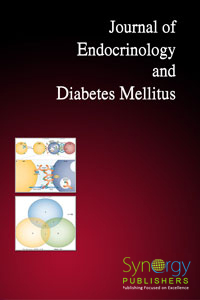
Large Malignant Pheochromocytoma: About Three Cases (Pages 1-6)
l.Motaib1, G. El Mghari1, S. Hiroual2, A. Matrane2 and N. El Ansari1
1Department of Endocrinology, Diabetology and Metabolic Diseases, King Mohammed VI University Hospital, PCIM Laboratory, Faculty of Medicine, Marrakesh, Morocco; 2Department of Nuclear Medicine, King Mohammed VI University Hospital, Marrakesh, Morocco
DOI: http://dx.doi.org/10.12970/2310-9971.2015.03.01.1
Abstract: Introduction: Malignant pheochromocytomas are rare tumors which carry a poor prognosis and their clinical presentation is variable. Malignancy is defined by the presence of local invasion and/or metastases. In this report, we describe three cases of large malignant pheochromocytomas.
Cases Presentation: The three cases have presented abdominal masses. Two patients complained of hypochondrium pain, and the third one was asymptomatic. One of the patients experienced sweating for 2 years, while the two others had no symptoms suggesting the hyper secretion of catecholamines. Urinalysis revealed elevation of daily urinary excretion of catecholamine metabolites in two cases and the computed tomography (CT) revealed large adrenal masses in the three cases. The malignancy was confirmed by the presence of multiple liver, lung and bone metastases. Surgery was performed in one case, but the tumor resection was impossible because the mass was adherent to great vessels. Calcitonin, intact parathormone (PTH) and calcium were normal in the 3 cases, which ruled out multiple endocrine neoplasia syndrome type 2. Otherwise, there was no sign suggesting phacomatosis. Two patients died before starting therapy, while in the third case the treatment considered was surgery and chemotherapy regimen of cyclophosphamide, dacarbazine and vincristine (CVD). Follow-up, showed a progression of tumor size with no significant improvement of metastatic disease.
Conclusion: Malignant pheochromocytomas are particularly rare and aggressive tumors. Despite advances in diagnosis and treatment of malignant pheochromocytomas, their management is still a real dilemma, especially in our context because of the lack of diagnostic tools such as genetic analysis and the cost of therapy.
Keywords: Pheochromocytoma, Malignancy, metastases, Metaiodobenzylguanidine, chemotherapy. Read more

